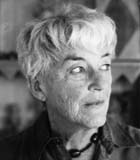 An interesting row has broken out between Inga Clendinnen, a distinguished historian, and the author Kate Grenville, whose book The Secret River was shortlisted for this year's Man Booker Prize. (I read Secret River last month, and found it moving and profound.)
An interesting row has broken out between Inga Clendinnen, a distinguished historian, and the author Kate Grenville, whose book The Secret River was shortlisted for this year's Man Booker Prize. (I read Secret River last month, and found it moving and profound.)The Secret River is a fiction of first contact, based on research in Grenville's family history - her account of researching the book is a fascinating read, too. It's the story of a London boatsman sent to New South Wales for theft, whose son and pregnant wife get to come along, too. Ferrying goods up an apparently undeveloped river north of Sydney the protagonist Thornhill spots a flat verdant area between loops of the river, and eventually settles his family there. Of course it was not uninhabited, and conflict with the Aborigines ensues.
The other settlers along the river run the gamut from friendly to the Aborigines to murderous. Thornhill tries to mind his own business, which of course is more easily said than done. The brutality of one of his fellow settlers provokes Aboriginal reprisals - and all the while the Thornhills are sitting on land the local Aborigenes relied on for food. Bad things happen.
 But the Thornhills survive and thrive. (All his children survive, a minor miracle for the early 19th century.) His wife Sal gives up her dream of returning to London - most of her children were born in this land, she says - and enjoys life as a wealthy countrywoman. Thornhill remains haunted by the cliffs across the river, which he can't stop scanning for Aborigenes.
But the Thornhills survive and thrive. (All his children survive, a minor miracle for the early 19th century.) His wife Sal gives up her dream of returning to London - most of her children were born in this land, she says - and enjoys life as a wealthy countrywoman. Thornhill remains haunted by the cliffs across the river, which he can't stop scanning for Aborigenes.This summary doesn't do the book justice - it's well worth reading. It's a moving and well-written book, working slowly but powerfully to the tragic climax and in some ways even more unnerving continuation of the story. It makes the challenges and compromises of ordinary people in the first decades of European settlement comprehensible and moving, acknowledging the crimes which attended the nation's founding.
Or so I thought until I read Inga Clendinnen's "The History Question: Who Owns the Past?" - a lengthy essay (in a wonderful publication called Quarterly Essay, which each season publishes one long essay on a current topic and a dozen responses to the last one) on contemporary discussions about history, especially Australian history. It's mainly provoked by Prime Minister John Howard's critique of the "black armband version" of Australian history and call for an affirming national narrative which will communicate "core Australian values" to future generations, especially immigrants.
 Attacking his view is like shooting fish in a barrel, so Clendinnen's discussion ranges broadly to include not only the "Stolen Generations" but Waltzing Matilda (extract available online) and ANZAC Day.
Attacking his view is like shooting fish in a barrel, so Clendinnen's discussion ranges broadly to include not only the "Stolen Generations" but Waltzing Matilda (extract available online) and ANZAC Day.And Grenville's Secret River. In a television interview Grenville had rather unwisely claimed that in novels like her own novelists were doing a new kind of history, indeed a work of history historians could not match, since it lets the reader really enter into the past. Clendinnen, who's done important work on past cultures and events like the Aztecs and the Holocaust, will have none of this. The past is a foreign country, our empathy is more likely to blind us to it than to give us entry. One of the things historians do is protect the past from contemporary appropriations.
Here's Clendinnen's retort to Grenville's claim to have written more authentic history because she not only read early colonial sources but subjected herself to a stormy passage across the bay and spent a night in the bush:
Some engaged reading, some preliminary flexing of the imagination, a run, a vault, and presto! you are there. How do you know you are are now in the Past? Because while the place might look exotic, you understand it so much better than the complicated place in which you usually live. In the novelist’s “past” everyone behaves delightfully, “in character”, and everyone submits to the plot. The novelist might surprise her readers. She will never surprise herself.
I can't wait for the responses!